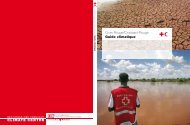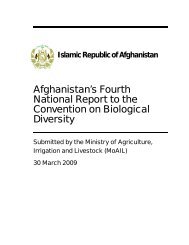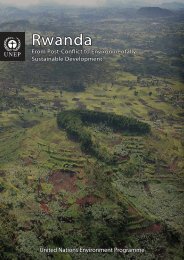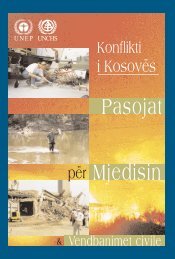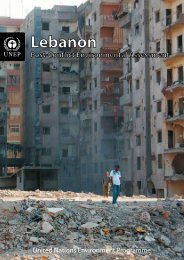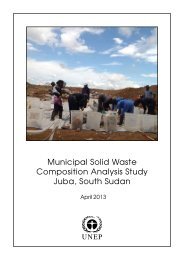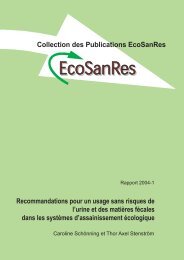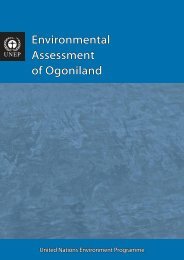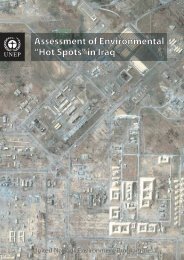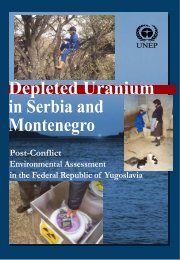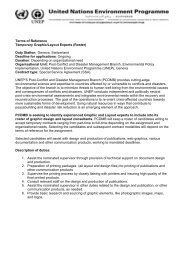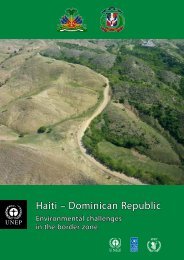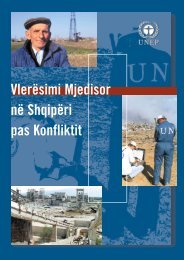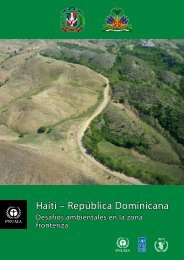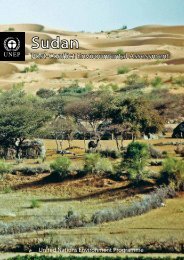state of the environment in Somalia - Disasters and Conflicts - UNEP
state of the environment in Somalia - Disasters and Conflicts - UNEP
state of the environment in Somalia - Disasters and Conflicts - UNEP
Create successful ePaper yourself
Turn your PDF publications into a flip-book with our unique Google optimized e-Paper software.
Box 2. The Somali Traditional ecological classification system, deegaan<br />
The Somali people, especially <strong>the</strong> nomads, who live <strong>in</strong> close contact with <strong>the</strong> <strong>environment</strong> have an<br />
extended knowledge <strong>of</strong> plant-animal-fundamentals (Barkhadle, 1993). Most plants <strong>and</strong> animals have a<br />
local name <strong>and</strong> <strong>the</strong>ir phenology, distribution <strong>and</strong> ecological zones are known: <strong>the</strong> use <strong>of</strong> virtually every<br />
plant with<strong>in</strong> <strong>the</strong> graz<strong>in</strong>g zone – <strong>the</strong> deegaan, which might range from 200 km 2 to 2,000 km 2 – is known.<br />
Under <strong>the</strong> traditional system <strong>of</strong> ecological classification, 16 categories are recognized, as follows<br />
(Barkhadle, 1993):<br />
Guban – “burnt area” <strong>in</strong> <strong>Somalia</strong> language – l<strong>and</strong> (Dhulka Guban)<br />
Buraha – mounta<strong>in</strong> – l<strong>and</strong> (Dhulka Buuraleyo)<br />
Howd – bush or thicket – l<strong>and</strong> (Dhulka Howd)<br />
Daror – large pla<strong>in</strong> – l<strong>and</strong> (Dhulka Dharoor)<br />
Sol – a highl<strong>and</strong> area – l<strong>and</strong> (Dhulka Sool)<br />
Nugal – a specific valley – l<strong>and</strong> (Dhulka Nugaal)<br />
Mudug – much <strong>of</strong> central <strong>Somalia</strong> – l<strong>and</strong> (Dhulka Mudug)<br />
Iid – named after <strong>the</strong> yicib plant – l<strong>and</strong> (Dhulka Ciid)<br />
Deh – without high shrubs or trees – l<strong>and</strong> (Dhulka Deexda)<br />
Doboy – clay – l<strong>and</strong> (Dhulka Dhobooy)<br />
Bakol – an area where Commiphora trees dom<strong>in</strong>ate – l<strong>and</strong> (Dhulka Bakool)<br />
Gedo – l<strong>and</strong> only suitable for animal (especially camel) graz<strong>in</strong>g) – l<strong>and</strong> (Dhulka Gedo)<br />
Bay – <strong>the</strong> area which receives <strong>the</strong> highest ra<strong>in</strong>fall – l<strong>and</strong> (Dhulka Baay)<br />
Adable –flat area with small mounta<strong>in</strong>s – l<strong>and</strong> (Dhulka Adableh)<br />
Doy – between <strong>the</strong> two banks <strong>of</strong> <strong>the</strong> Jubba <strong>and</strong> Shabeelle rivers – l<strong>and</strong> (Dhulka Dooy)<br />
Wamo – l<strong>and</strong> ly<strong>in</strong>g between Badhaadhe <strong>and</strong> Kismayo <strong>and</strong> from Kismayo to <strong>the</strong> Kenyan border – l<strong>and</strong><br />
(Dhulka Waamo)<br />
based <strong>in</strong> Nairobi, Kenya. The full cab<strong>in</strong>et returned to <strong>Somalia</strong> <strong>in</strong> June 2005 to beg<strong>in</strong> <strong>the</strong> difficult process <strong>of</strong><br />
national reconciliation <strong>and</strong> reconstruction.<br />
Three teams were established, <strong>of</strong> which <strong>the</strong> first comprised 30 members <strong>of</strong> government led by <strong>the</strong> Prime<br />
M<strong>in</strong>ister <strong>and</strong> left for Mogadishu <strong>in</strong> February 2005. Smaller groups from this team were <strong>the</strong>n deployed to o<strong>the</strong>r<br />
regions <strong>in</strong> <strong>the</strong> south <strong>and</strong> central <strong>Somalia</strong> with <strong>the</strong> <strong>in</strong>tention <strong>of</strong> establish<strong>in</strong>g <strong>the</strong> TFG’s presence <strong>the</strong>re <strong>and</strong> to start<br />
dialogue with <strong>the</strong> people. A second group <strong>of</strong> m<strong>in</strong>isters was tasked with <strong>the</strong> physical relocation <strong>of</strong> <strong>the</strong> members<br />
<strong>of</strong> parliament <strong>and</strong> <strong>the</strong> delegates who participated <strong>in</strong> <strong>the</strong> peace process, while a third team, which<br />
rema<strong>in</strong>ed <strong>in</strong> Nairobi, assessed <strong>the</strong> challenges <strong>and</strong> obstacles to <strong>the</strong> relocation process <strong>and</strong> prepared <strong>the</strong><br />
agenda, strategies <strong>and</strong> an action plan for <strong>the</strong> <strong>in</strong>stallation <strong>of</strong> <strong>the</strong> government <strong>in</strong>side <strong>Somalia</strong>. For adm<strong>in</strong>istrative<br />
purposes, <strong>Somalia</strong> is divided <strong>in</strong>to <strong>the</strong> 18 regions or gobollada (s<strong>in</strong>gular gobolka) <strong>of</strong> Awdal, Bakool, Banaadir,<br />
Bari, Bay, Galguduud, Gedo, Hiran, Jubbada Dhexe, Jubbada Hoose, Mudug, Nugaal, Sanaag, Shabeellaha<br />
Dhexe, Shabeellaha Hoose, Sool, Togdheer, <strong>and</strong> Woqooyi Galbeed.<br />
Despite <strong>the</strong> existence <strong>of</strong> a new government, a proliferation <strong>of</strong> compet<strong>in</strong>g adm<strong>in</strong>istrations, factions <strong>and</strong> militias<br />
rema<strong>in</strong>, all <strong>of</strong> which strive to assert <strong>the</strong>ir own authority (UNHCR, 2005a). Hence <strong>the</strong>re is <strong>the</strong> self-declared <strong>state</strong><br />
call<strong>in</strong>g itself “Somalil<strong>and</strong>” <strong>in</strong> <strong>the</strong> north-west, <strong>the</strong> self-declared autonomous region call<strong>in</strong>g itself “Puntl<strong>and</strong>” <strong>in</strong><br />
<strong>the</strong> north-east, <strong>and</strong> <strong>the</strong> cont<strong>in</strong>u<strong>in</strong>g warlordism <strong>in</strong> “Jubbal<strong>and</strong>” <strong>in</strong> <strong>and</strong> around Mogadishu <strong>in</strong> <strong>the</strong> south. Nei<strong>the</strong>r<br />
“Somalil<strong>and</strong>” nor “Puntl<strong>and</strong>” has been recognized by <strong>the</strong> <strong>in</strong>ternational community, but it is only <strong>in</strong> <strong>the</strong>se two<br />
Environment <strong>in</strong> <strong>Somalia</strong> 14 <strong>UNEP</strong> Desk Study



